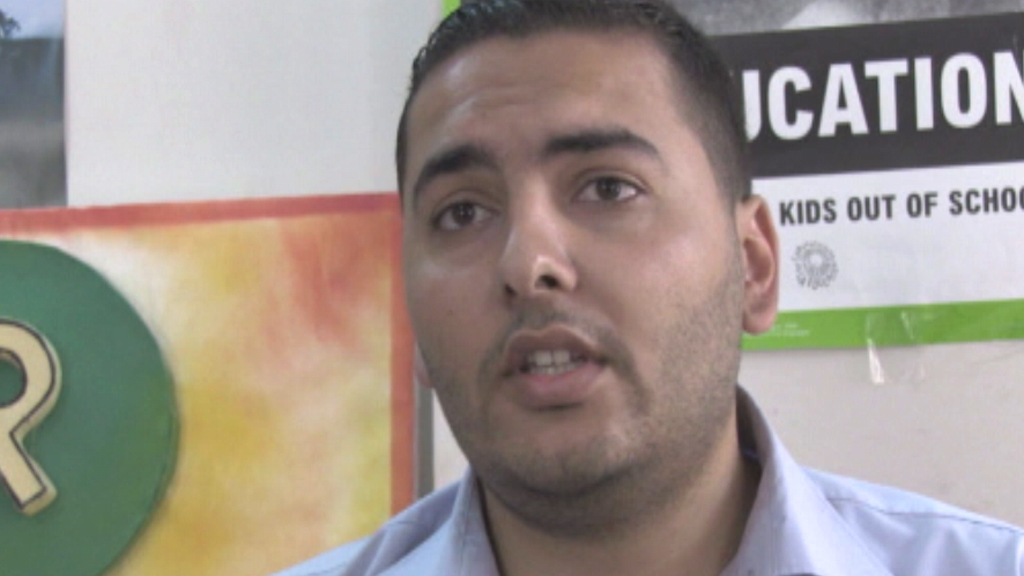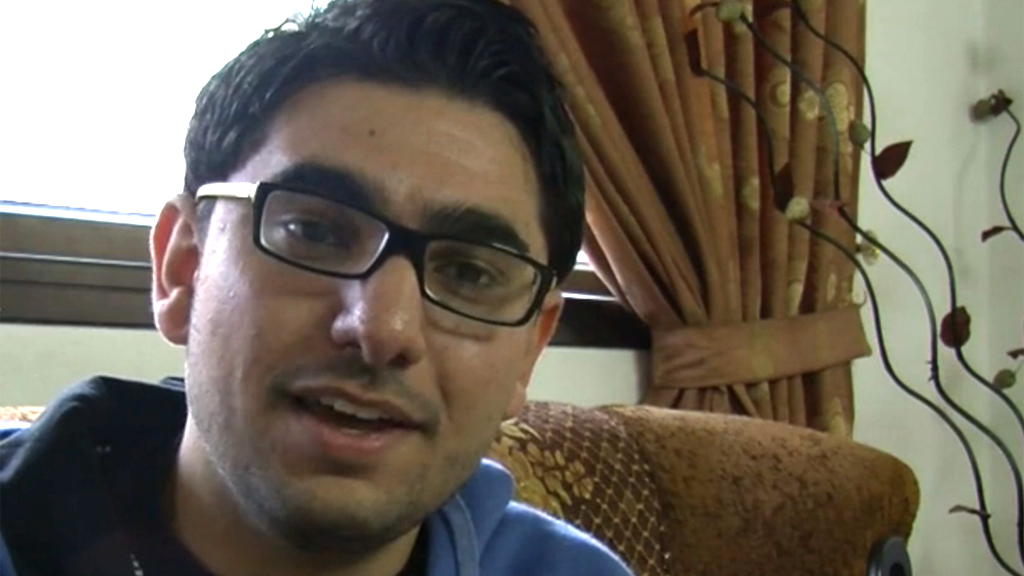Gaza’s tech boom: ‘ICT represents hope for us’
Six years on from Israel’s imposed blockade of Gaza, Channel 4 News speaks to the tech entrepreneurs bypassing the blockade and developing software for the global online market.
- Chapters
- descriptions off, selected
- subtitles off, selected
- captions settings, opens captions settings dialog
- captions off, selected
This is a modal window.
This is a modal window. This modal can be closed by pressing the Escape key or activating the close button.
After getting a business licence just one month ago, one of Gaza’s 2D animation software companies has already secured six contracts with international companies, including one in Canada.
This is a big deal for Mustafa Abu Ramar, 25, and his partner, who founded Cat Shadow: they live in the Gaza Strip, which since 2007 has been subject to travel and trade restrictions, making international business very difficult.
“I feel like I was in darkness. I could do the programming, I could do the animation – but this opportunity is very good for me,” he told Channel 4 News.
Mr Ramar is among the 2,000 ICT (information and communications technology) graduates in Gaza each year, part of a growing community of programmers and developers who see technology as a way to work across borders – and the blockade.
If you have your laptop and fairly good internet connection, you’re good to go – Mohmmed Ferwana
Mohmmed Ferwana, 22, another graduate, is using Microsoft Kinect motion sensor software to develop Teacher Assist, an educational product for teachers and pupils.
“ICT represents hope for us,” he told Channel 4 News. “If you have your laptop and fairly good internet connection, you’re good to go.
“Even if you can’t sell [your software] in Gaza, you can sell online. That’s why it’s the new thing around here.”

Tech boom
For the 1.6 million people living in the 40km-long Gaza strip, this is a huge advantage. A blockade of the land, air and sea of Gaza was imposed by the Israeli government on 14 June, 2007, amid security concerns following the election of Hamas.
Travel has eased since 2010, but heavy restrictions remain on almost all goods into and out of the Gaza Strip. This has had a huge impact on the local economy: nearly 60 per cent of Gaza’s businesses have closed, while unemployment is at 31 per cent and almost 50 per cent for young people. And this in turn has affected poverty levels: around 80 per cent of the population are reliant on humanitarian aid.
But the ICT sector is starting to be a key growth industry. The sector, including telecommunications, contributed 6.1 per cent of Palestinian GDP by 2011, seven times more than in 2008.
Seeing the potential, Oxfam is funding 20 ICT businesses over the next two years through its ICT Danida project, in partnership with the Palestinian Information Communication Technology Institute (Picti) and the University of Applied Sciences (UCAS).
Applicants can apply for up to $7,000 and get access to specialist training in business, marketing and technical skills to help their ideas become a reality. Although in its early stages, some projects, like Mr Ramar’s, are already seeing success.
Read more: Battle of the hastags, as the Gaza conflict is waged online
No borders online

Haytham Abushaban from Picti said the reason the sector is booming is because it is borderless – and grows organically.
“People do not need to move. They need the knowledge, experience or tutorials via the internet to start to work on their projects and ideas,” he told Channel 4 News. “But it mainly depends on the talent, not where they are.”
Khalil Saleem (pictured right) is unofficially described as one of Gaza’s top programmers. And yet at only 26-years-old, he is a pharmacist by trade. “I knew there was no future for pharmacists here. There are no jobs for us,” he told Channel 4 News. “There is nothing except working online via the internet.”
With a grant from Oxfam, Mr Saleem has developed Hope, a mobile application for people with hearing difficulties to help them communicate with the non-deaf. The app acts as a dictionary, speech recognition and motion detection tool in one. Deaf users can sign at the app and it will translate their sign into text.
I would love it if someday I could just simply order something online, and get it, within a week or so. Mohmmed Ferwana
Gaza has a higher than average proportion of people with hearing difficulties, as a result of the sound of explosions and air strikes – and particularly after Operation Cast Lead in 2009.
“I realised that there is a great difficulty in communicating with deaf people, and vice versa,” Mr Saleem told Channel 4 News. “I decided to step in.”
Outsourcing
Outsourcing ICT is already an established industry in the Palestinian territories, particularly in the West Bank. And despite political tensions, some tech companies have benefited from neigbhbouring Israel’s technology boom. Barack Obama recently lauded the efforts of US company Cisco, which has invested $15m in Palestinian start-ups and training since 2008, and some of the companies’ Israeli experts have worked with Palestinians in Ramallah, in the West Bank.
The idea of working with Israeli companies is more controversial in Gaza. But even aside from the politics, ICT graduates and grassroots organisations like Peeks – short for “Palestinian geeks” – are keen to foster product-based start-ups that are much more profitable for founders and give entrepreneurs ownership over their ideas. Successful companies like the Linked-in style Souktel and hotel and events booking website Yamsafer, that has raised $1m in venture capital, are the Holy Grail.
Tunnel travel

But huge challenges remain. A recent report by the Palestinian Information Technology Association of Companies found that the imposed blockade had restricted chances for outsourcing and was a big massive to growth.
One major challenge is actually getting hold of products. It took Mr Ferwana (pictured left) three months just to receive the original Kinect product from the US.
“We had to go through hell and back to get the Kinect,” he told Channel 4 News. “We ordered it online from America. We had to ship it from America, to Jordan, to Egypt, through the tunnels… I would love it if someday I could just simply order something online, and get it, within a week or so.”
The internet is our face to the world and we can look to the world through the internet. We are travelling – Mustafa Abu Ramar
Another has been the $5,000 limit on international money transfers. Though international bank accounts are now more accessible.
Then there is the electricity. Channel 4 News encountered numerous power cuts and poor internet connections while speaking to interviewees, and this is a huge problem for would-be companies.
“We struggle with this on a daily basis,” said Mr Ferwana. “This is really frustrating, because speaking from a computer programmer’s point of view, I need electricity to work. It causes massive delays in my deadlines.”
And while the latest smartphones and products can be smuggled to Gaza from neighbouring Egypt, Israel has denied Palestinian companies access to the 3G network.
But despite the struggles, there is huge hope for the potential of the ICT sector, and the potential of working online generally.
Palestinians have the third highest rates of internet use in the Arab world after Lebanon and Kuwait, and many of these budding tech start-ups – like entrepreneurs the world over – use their online networks and tutorials to build their expertise.
“The internet is our face to the world,” says Mr Ramar, “and we can look to the world through the internet. We are travelling.”
Video editor: Josh Ho, Gaza footage: Jo Harrison